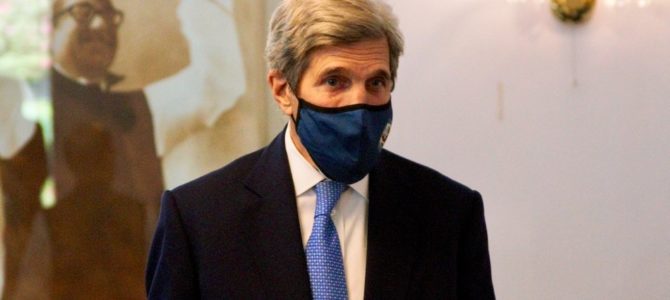
Maybe we should be giving John Kerry the benefit of the doubt. After all, why wouldn’t Americans take the word of a former secretary of state over that of Iranian Foreign Minister Javad Zarif, an official of a country that is an open adversary of the United States? Since the history of American negotiations with Iran largely consists of lies told by the mouthpieces of the Islamist regime, there’s good reason to be skeptical of anything that comes out of Zarif’s mouth.
Kerry is under fire because of a New York Times article that reports the paper obtained a leaked tape of a conversation between Zarif and an ally. Most of the article concerned Zarif’s complaints about his rivals within the Islamist regime, especially the late Qassim Suleimani of the Islamic Revolutionary Guard Corps, the terrorist leader U.S. forces killed in 2020.
But the Times buried the lede in its story, waiting until the 22nd paragraph before dropping the real bombshell, which consisted of Zarif claiming it was Kerry who had informed him of Israeli attacks on Iranian targets: “It was former U.S. Foreign Secretary [sic] John Kerry who told me Israel had launched more than 200 attacks on Iranian forces in Syria.”
Zarif didn’t specify whether Kerry said this while he was secretary of state or afterward, during meetings in which the man currently serving as Joe Biden’s climate czar sought to advise the Iranians on how to thwart Trump administration efforts to force them to renegotiate the nuclear pact. It also isn’t clear whether these confidences were given before some of the Israeli attacks became public knowledge.
Yet the notion that a high-ranking American official — either in or out of office — should have passed intelligence of any sort to a hostile foreign power that his own department has repeatedly labeled as the world’s leading state sponsor of terrorism isn’t merely shocking; it’s a serious crime. But should the scoop reported by The New York Times be believed?
Liars Abound
Kerry has denied the charge. While Kerry has always upheld Zarif as a reliable negotiating partner, Zarif is a serial liar. Zarif has continually lied about the purpose of Iran’s nuclear program, insisting it is peaceful even though its weapons program was no secret, something confirmed by the treasure trove of Iranian documents that Israeli intelligence made public in 2018.
He’s spent the last decade of negotiations with the West over the nuclear issue misrepresenting his country’s quest for regional hegemony, support for terrorist groups, tyrannical rule at home, and the elaborate subterfuges it has perpetrated with respect to its adherence to both United Nations nonproliferation resolutions and the nuclear deal agreed to by the West in 2015.
But the United States trusted Zarif and his government to keep their word in observing the nuclear agreement. The Biden administration has rushed back into negotiations with Iran, whose intent is to merely entice them back into President Obama’s deal although it will expire by the end of the decade, leaving the Iranians a legal path to a nuclear weapon. If we are ready to give Kerry a pass because of Zarif’s mendacity, then the rationale for the current negotiations and the nuclear pact is debunked.
Yet the climate czar and former secretary of state made no secret of his closeness to Zarif. That is, after all, Kerry’s modus operandi as a diplomat. During his tenure at the State Department, a great emphasis was placed on the good relationships he said he developed with representatives of nations that are America’s adversaries. That included not only Zarif but also Sergei Lavrov, Russia’s foreign minister, with whom, a fawning article in the New York Times informed us, Kerry shared a love of ice hockey.
What makes the accusation against Kerry so convincing, however, is that he continued meeting with Zarif even after he left office. In 2018, the Boston Globe reported Kerry consulted with Zarif and advised his former negotiating partner not to talk with the Trump administration.
Trump withdrew from the nuclear deal as part of a “maximum pressure” campaign to force the Iranians to agree to a new, tougher agreement that would eliminate sunset clauses, as well as include bans on Tehran’s role as the world’s leading state sponsor of international terrorism and its illegal missile-building. Kerry told Zarif to simply wait out Trump and then deal with a more pliant Democrat he hoped would be elected in 2020.
That’s exactly what happened. Now the Iranians are reaping the benefits. Biden’s foreign-policy team, composed almost entirely of veterans of the administration of former President Barack Obama, are again resuming their past practice of appeasing the Iranians with concessions in the works to entice Tehran to return to a deal with little hope of improving upon it.
Abandoning Israel
The only description for Kerry’s involvement with Iran is “collusion.” But unlike the three-year effort to hobble the Trump administration carried out by Democrats and their media allies over what ultimately proved to be a false accusation, Kerry’s actions have never been a secret. And while Democrats destroyed the career of former Trump national security advisor Gen. Michael Flynn over charges that he ran afoul of the Logan Act that prohibits private citizens from conducting foreign policy, Kerry violated that rarely enforced law.
The question of Kerry’s connection to Iran is important because it comes in the context of the growing tension with Israel over its efforts to sabotage the Iranian nuclear program. The administration went out of its way to disavow any role in Israel’s recent successful attack on Iran’s Natanz nuclear facility.
These off-the-record comments imply the administration regarded Israel’s efforts as seeking to forestall an American push to re-engage with Iran. Sen. Chris Murphy, D-Conn., fulminated about the attack, saying he would demand a full security briefing on it while sending a message to the Israelis that he — and other members of his party — take it as a matter of faith that diplomacy is the “only” acceptable path for relations with Iran and that Israel’s efforts were bound to fail.
Secretary of State Antony Blinken has essentially outsourced the nuclear issue to Robert Malley, Biden’s special envoy on Iran. Malley was not only one of the chief architects of the disastrous nuclear deal with Iran, but is also a veteran appeaser and critic of Israel. The United States is asking Israel to back off on its efforts to stop Iran and to trust Biden’s team to deliver a diplomatic solution to the problem. But given that Malley has demonstrated no interest in strengthening the nuclear pact, that’s a leap of faith that no Israeli government can make.
Critics of Obama’s signature foreign policy “achievement” point to the way the deal empowered and enriched a rogue regime and doubt whether its goal may have been part of an effort to shift American policy in the region from one of an alliance with Israel and other Gulf states to one with Iran. Few would have believed this claim in 2015. Yet the effects of the agreement on the region, coupled with Kerry’s actions and the efforts of Obama alumni to return to the deal on Biden’s watch, lend credibility to this theory.
The inescapable conclusion from these events goes beyond Kerry’s culpability. No matter what Kerry told Zarif, the Israelis should be in no doubt about the fact that the United States is abandoning them on Iran.









